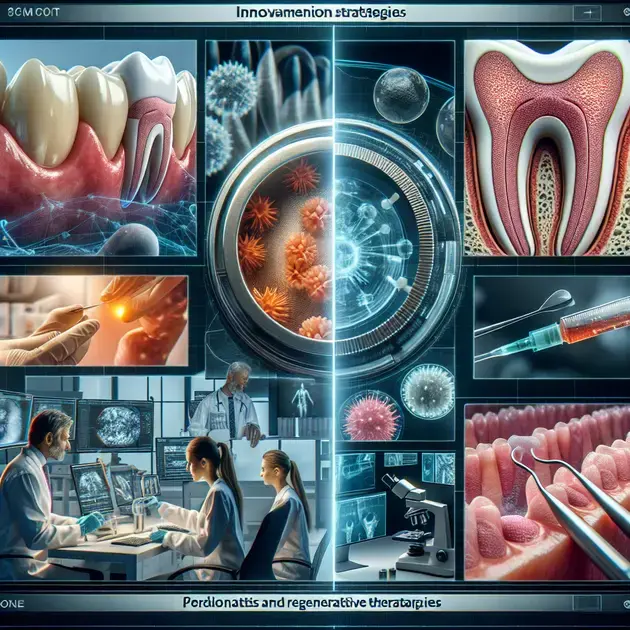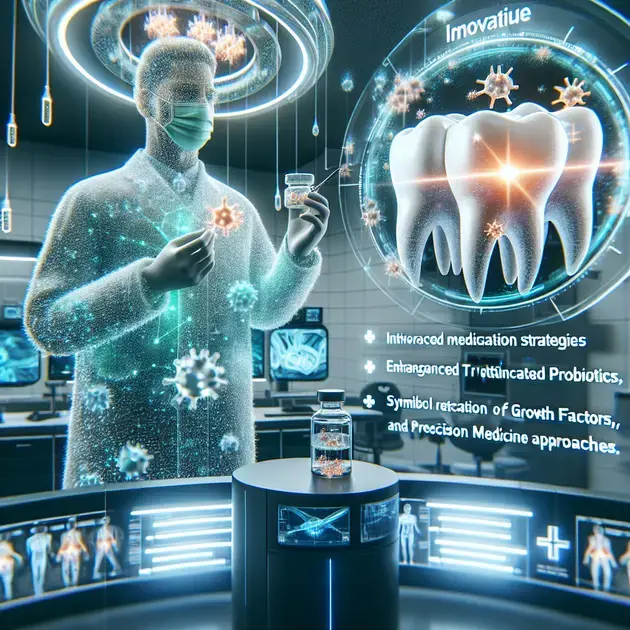When it comes to combating periodontitis, finding effective medication is crucial in maintaining oral health. In this comprehensive guide, we will explore the various options available to treat this common inflammatory disease of the gums.
Periodontitis affects millions of people worldwide, leading to gum inflammation, bad breath, and even tooth loss if left untreated. The right medication can make a significant difference in managing and improving the symptoms associated with this condition.

Understanding Periodontitis: Causes and Symptoms Analysis
Periodontitis is a severe gum infection that damages the soft tissue and destroys the bone that supports your teeth. It is caused by the buildup of plaque – a sticky film of bacteria that forms on your teeth. If not removed through daily brushing and flossing, this plaque can harden into tartar, leading to gum inflammation and potential infection. Other factors that can contribute to periodontitis include smoking, poor oral hygiene, genetic predisposition, and certain medical conditions like diabetes.
Common symptoms of periodontitis include swollen or receding gums, persistent bad breath, loose teeth, painful chewing, and sensitive teeth. If left untreated, it can result in tooth loss and other serious health issues. To diagnose periodontitis, your dentist will measure the depth of the pockets around your teeth, take X-rays to check for bone loss, and assess your overall oral health.
It is essential to seek treatment for periodontitis to prevent further damage and maintain good oral health. Your dentist may recommend professional cleaning to remove plaque and tartar, antibiotics to fight the infection, or surgery to repair damaged tissues. Additionally, adopting a strict oral hygiene routine and making lifestyle changes like quitting smoking can help manage the condition.
By understanding the causes and symptoms of periodontitis, you can take proactive steps to protect your oral health and prevent the progression of this serious gum disease.
Exploring Medication Options for Periodontitis Treatment
When it comes to treating periodontitis, medication can play a crucial role in controlling the infection and promoting gum healing. One common medication prescribed for periodontitis is antibiotic therapy, which helps eliminate the bacteria causing the infection. Antibiotics can be taken orally or applied directly to the affected areas, depending on the severity of the condition.
In addition to antibiotics, your dentist may recommend antimicrobial mouth rinses to reduce bacteria and prevent plaque buildup. These rinses can help control infection and promote overall oral health when used in conjunction with regular brushing and flossing. It is essential to follow your dentist’s instructions on how to use these medications properly for the best results.
Another medication option for periodontitis treatment is anti-inflammatory drugs, such as ibuprofen, to reduce gum inflammation and pain. These drugs can help manage discomfort and swelling associated with the infection, making it easier to maintain good oral hygiene practices. Your dentist may recommend a specific dosage and treatment duration based on your individual needs.
By exploring different medication options for periodontitis treatment and working closely with your dental provider, you can create a comprehensive plan to manage the infection effectively and improve your oral health in the long term.
Managing Periodontitis Symptoms: The Role of Effective Medication
Managing the symptoms of periodontitis is crucial for preventing further damage to your gums and teeth. Effective medication can help control pain, reduce inflammation, and fight infection, allowing for better management of the condition. One key aspect of managing periodontitis symptoms is the consistent use of prescribed medications as directed by your dentist.
In addition to medication, maintaining good oral hygiene practices is essential for managing periodontitis symptoms. Brushing your teeth twice a day, flossing regularly, and using an antimicrobial mouth rinse can help reduce bacteria in your mouth and prevent plaque buildup. These habits can complement the effects of medication and improve the overall health of your gums.
Furthermore, lifestyle changes such as quitting smoking, reducing stress, and eating a balanced diet can contribute to better symptom management and overall oral health. Smoking can hinder the healing process and increase the risk of complications, so quitting this habit is particularly important for individuals with periodontitis.
Regular visits to your dentist for professional cleanings and check-ups are also crucial for monitoring the progression of periodontitis and adjusting your treatment plan as needed. By working closely with your dental provider and following their recommendations for medication and oral care, you can effectively manage the symptoms of periodontitis and prevent further complications.

Exploring Different Medication Approaches for Periodontitis Management
When it comes to managing periodontitis, exploring different medication approaches can be crucial in achieving successful outcomes. One innovative medication strategy that has shown promising results is the use of antimicrobial mouth rinses. These rinses are designed to target and eliminate harmful bacteria in the mouth, helping to reduce inflammation and promote gum health. By incorporating antimicrobial mouth rinses into a comprehensive periodontal treatment plan, patients can experience improved overall oral health.
Another medication approach worth exploring is the use of local delivery antimicrobials, such as gels or chips, directly into the periodontal pockets. These localized treatments can effectively target bacteria in hard-to-reach areas, providing a more direct and concentrated approach to combating periodontitis. By combining local delivery antimicrobials with traditional scaling and root planing, clinicians can enhance the effectiveness of their treatment protocols.
Furthermore, systemic antibiotics may also play a role in managing periodontitis, especially in cases of severe or refractory gum disease. Antibiotics can help reduce the bacterial load throughout the body, supporting the healing process and reducing the risk of recurrent infections. However, it is essential to use antibiotics judiciously and in conjunction with other treatment modalities to maximize their benefits while minimizing the risk of antibiotic resistance.
For patients seeking natural alternatives, herbal antimicrobial agents like tea tree oil or echinacea can offer additional support in managing periodontitis. These natural remedies have been shown to possess antimicrobial properties that can help control the growth of bacteria in the mouth, contributing to a healthier oral environment. When integrated into a comprehensive treatment plan, herbal antimicrobial agents can complement traditional periodontal therapies effectively.
In conclusion, exploring different medication approaches for periodontitis management is essential for optimizing treatment outcomes and maintaining oral health. Whether through antimicrobial mouth rinses, local delivery antimicrobials, systemic antibiotics, or herbal remedies, incorporating diverse medication strategies can provide patients with personalized and effective care for their gum disease.
Innovative Medication Strategies for Enhanced Treatment Outcomes
When it comes to achieving enhanced treatment outcomes for periodontitis, innovative medication strategies can offer new possibilities for clinicians and patients alike. One such strategy involves the use of advanced probiotics specifically formulated to support oral health. These beneficial bacteria can help restore the natural balance of the oral microbiome, reducing inflammation and promoting gum tissue regeneration.
Another innovative medication approach is the utilization of growth factors to stimulate tissue repair and regeneration in the periodontal tissues. By introducing growth factors such as platelet-derived growth factor (PDGF) or recombinant human fibroblast growth factor (rhFGF) into the treatment plan, clinicians can enhance the healing process and promote the formation of new periodontal ligament and bone.
Additionally, the integration of photodynamic therapy (PDT) with photosensitizing agents can provide a non-invasive and effective method for targeting and eliminating pathogenic bacteria in the periodontal pockets. PDT has been shown to reduce bacterial load, inflammation, and pocket depths, leading to improved periodontal health and reduced risk of disease progression.
For patients looking for personalized treatment options, precision medicine approaches that consider individual genetic factors and microbiome composition can lead to more tailored and effective medication strategies. By analyzing a patient’s genetic predispositions and oral microbiome profile, clinicians can design personalized medication regimens that address the specific underlying causes of their periodontitis.
In summary, innovative medication strategies are transforming the landscape of periodontitis management, offering new opportunities for enhanced treatment outcomes and improved patient care. By incorporating probiotics, growth factors, photodynamic therapy, and precision medicine approaches into clinical practice, clinicians can provide cutting-edge treatments that address the root causes of gum disease and promote long-term oral health.
Maximizing Periodontitis Management with Advanced Medication Options
Maximizing the management of periodontitis requires the utilization of advanced medication options that target the underlying causes of gum disease and promote optimal treatment outcomes. One key advanced medication option is the use of host modulation therapy, which aims to modulate the host response to periodontal pathogens and inflammation. Agents such as non-steroidal anti-inflammatory drugs (NSAIDs) or chemically modified tetracyclines can help regulate the immune response and reduce tissue destruction in the periodontium.
Furthermore, the incorporation of tissue engineering approaches, such as enamel matrix proteins or growth factors, can enhance the regenerative capacity of the periodontal tissues. These advanced medication options stimulate the formation of new bone, cementum, and periodontal ligament, promoting the reconstruction of damaged periodontal structures and improving the long-term stability of the teeth.
In addition to traditional antimicrobials, the use of novel antimicrobial peptides (AMPs) represents a promising avenue for combating periodontitis. AMPs exhibit broad-spectrum antimicrobial activity against bacteria, fungi, and viruses, making them effective weapons against periodontal pathogens. By harnessing the unique properties of AMPs, clinicians can target and eliminate bacteria while minimizing the risk of resistance development.
Moreover, the integration of regenerative medicine techniques, such as stem cell therapy or gene therapy, holds great potential for revolutionizing periodontitis management. By harnessing the regenerative capacity of stem cells or manipulating gene expression in the periodontal tissues, clinicians can promote tissue repair, enhance wound healing, and even regenerate fully functional periodontal structures.
Overall, maximizing periodontitis management with advanced medication options requires a comprehensive and multidisciplinary approach that leverages the latest advancements in medication delivery, tissue engineering, antimicrobial therapy, and regenerative medicine. By embracing these cutting-edge strategies, clinicians can elevate the standard of care for patients with periodontitis and achieve superior treatment outcomes.
Conclusion
In conclusion, exploring different medication approaches in the management of periodontitis is vital for optimizing treatment outcomes and maintaining oral health. Whether through antimicrobial mouth rinses, local delivery antimicrobials, systemic antibiotics, or herbal remedies, incorporating diverse medication strategies can provide patients with personalized and effective care for their gum disease.
Moreover, innovative medication strategies have the potential to transform periodontitis management, offering enhanced treatment outcomes and improved patient care. By integrating probiotics, growth factors, photodynamic therapy, and precision medicine approaches, clinicians can deliver cutting-edge treatments that address the root causes of gum disease and promote long-term oral health.
Overall, maximizing periodontitis management with advanced medication options requires a comprehensive and multidisciplinary approach that harnesses the latest advancements in medication delivery, tissue engineering, antimicrobial therapy, and regenerative medicine. By embracing these cutting-edge strategies, clinicians can elevate the standard of care for patients with periodontitis, achieving superior treatment outcomes and improving the overall quality of life for individuals affected by gum disease.



